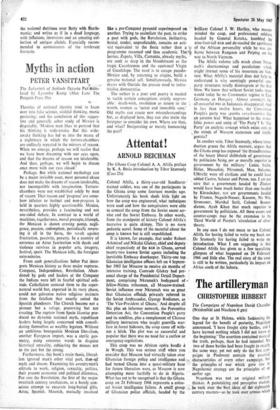Attentat !
ARNOLD BEICHMAN
The Ghana Coup Colonel A. A. Afrifa preface by K. A. Busia introduction by Tibor Szamuely (Cass 25s) Colonel Afrifa, a thirty-year-old Sandhurst- trained soldier, was one of the participants in the Ghana coup some fourteen months ago. Unfortunately his book sheds little light on how the coup was engineered, what techniques were used and how the conspirators were able to conceal the coup from the Soviet secret ser- vice and the Soviet Embassy. In other words, from the standpoint of history Colonel Afrifa's narrative is quite skimpy. This is no mere pedantic scowl. Some of the material about the coup is known but is still unpublished.
It is known, for example, that under Robert Arkmirof and Nikolai Glakey, chief and deputy chief respectively of the KGB in Ghana, served twenty-two known Soviet agents including the inevitable Embassy doorkeeper. Thirty-one top Ghanaian intelligence officers left on 4 Septem- ber 1965 for Moscow to receive six months of intensive training. Comrade Glakey had per- sonal charge of the Presidential Detail Depart- ment, comprising Nkrumah's bodyguard of fellow-Nzima tribesmen, all Moscow-trained. Soviet influence over Nkrumah was so great that Ghanaian officials privately referred to the Soviet Ambassador, Gyorgy Rodionov, as `The Vice-President of Ghana.' And despite all this plus an informer network, the Preventive Detention Act, the Convention People's party and its satellites, plus a complement of Chinese military instructors who taught guerrilla war- fare in forest hideouts, the coup came off with- out a hitch. The plot was so successful and popular that there was no need for a curfew or emergency regulations.
This coup was no African opera bouffe la Waugh. This was serious stuff when you consider that Moscow had virtually taken over Ghanaian foreign policy and intelligence and had turned Ghana into a quasi-military base for future liberation wars, as Moscow is now attempting more tactfully to do in Algeria. What has yet to be recognised is that the Ghana coup on 24 February 1966 represents a colos- sal Soviet intelligence failure. A small group of Ghanaian police officials, headed by the
brilliant Colonel J. W. Hartley, who master. minded the coup, and professional soldiers, headed by General Kotoka, humbled the nine-foot-tall KGB and de-stooled the apotheosis of the African personality while he was air- borne between Rangoon and Peiping on the way to North Vietnam.
The Afrifa volume tells much about Nkru- mah's shortcomings and peculations which might interest some of his mourners on Ven- ture. What Afrifa's material does not help us understand is why seemingly powerful one- party structures totally disintegrate at the first blow. We know that without Soviet tanks there would today be no Communist regime in East Germany or Hungary. Almost overnight the all-powerful PKI in Indonesia disappeared. And in less than twelve hours. the Convention People's party was spurlos terschwundcn like an autumn leaf. What happened to the mono- lithic power and unity of 'The Party'? Is 'The Party' an analytic concept which exists only in the minds of Western statesmen and intelli- gentsia?
In another vein, Tibor Szamuely, whose intro- duction graces the Afrifa memoir, argues that the Ghana coup has exposed 'the threadbareness of the hoary liberal shibboleth of government by politicians being per se morally superior to government by the military.' Lenin, Stalin, Hitler, Mussolini, Nkrumah, Mao, Sukarno, Ulbricht were all civilians and he could have added Castro, Salazar and Peron, too. I am not sure that a government headed by Zhukov would have been much better than one headed by Khrushchev, nor are governments headed by Franco, Naguib-Nasser, Kassem, Ne Win, Stroessner, Marshal Sarit, Colonel Boume- dienne, Ayub Khan that much superior to government by politicians. All these coups and counter-coups may be the extension to the Third World of Pareto's 'circulation of elites' theory.
In any case I do not mean to tax Colonel Afrifa for having failed to write my book nor Dr Szamuely for having failed to write my introduction. What I am suggesting is that Colonel Afrifa has given us a few tantalising glimpses of what happened on 24 February 1966 and little else. The real story of the coup is still to be written, particularly its impact on Africa south of the Sahara.


































 Previous page
Previous page